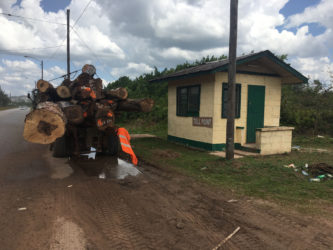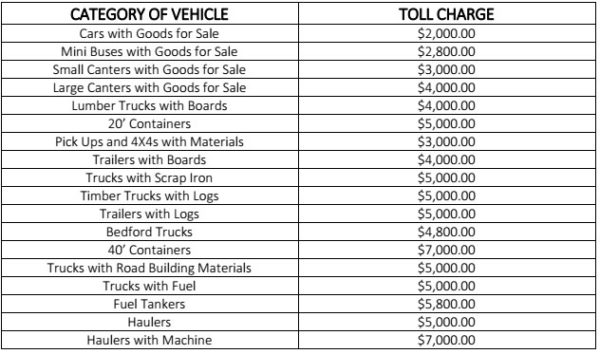The Linden Town Council has agreed to charge residents transporting goods 25% of the proposed Kara Kara bridge tolls, starting at the end of the month.
According to Linden Mayor Carwyn Holland, the Town Council is also currently exploring the options to not charge the Lindeners who are bringing in consumer goods.
However, he explained that persons are coming from other places around the country to compete with people in Linden, who are already paying their rates and taxes, which is unfair to them. He pointed out that while there is a base cost for persons out of Linden, persons who are registered for business in Linden will only have to pay a fraction of the base cost. “….Especially the loggers, they will have to pay 25% of whatever the toll is. So let’s say that it is $7,000 for a hauler then a Lindener will only have to pay 25% of that at the booth,” Holland explained.
Dozens of loggers gathered on Wednesday at the Egbert Benjamin Exhibition and Conference Centre at Mackenzie, where a fifth consultation was held with Holland and Linden Chamber of Commerce President Kevin De Jonge.

“The Linden loggers can comfortably say that they have successfully negotiated to pay 25% and the council will favourably grant them,” Holland explained afterward.
While there is a fixed charged for different types of vehicles that will be travelling into Linden, vehicles that are registered in Linden will only be required to pay 25% of the base fee per month. Holland explained that the loggers agreed to be billed on a monthly basis and also to contribute to projects.
“We believe it is unfair to the Lindeners, so as a result we have asked for the toll booth to come back and while it wouldn’t change the economic landscape overnight, it will just be one avenue of helping along those lines,” he said.
While it was originally said that the Lindeners were going to pay the same amount as persons coming from outside of Linden, the price has been negotiated after the consultations.
At Wednesday’s meeting, some of the loggers were dissatisfied with the reintroduction of the tolls again and explained that there was no reason to bring it back. However, some of them were in favour of it since it would mean additional revenues going to the council, which will in turn benefit the municipality greatly.
Explaining why the council decided to reintroduce the tolls, Holland pointed out that it was in existence since 1987 and was only stopped several years ago. “Under the last government, they would’ve stopped this toll booth for whatever reason they did in 2012,” Holland pointed out, while highlighting that the income that was generated from the tolls was used to help the township significantly since at that time they “weren’t given much assistance from the last regime.”
“We weren’t given much and the toll booth used to help out along with the reserve that we used to charge persons to put up sign boards,” he added, while stating that it will be reintroduced to generate revenue that the council needs in order to provide its services.
Holland stated that while the toll booth was supposed to resume operations since August and was postponed to the October 17, it has been delayed again and is expected to commence operations by the end of the month. “We had to extend and push back to allow for the consultations and proper advertisements and notification of the public,” he said.
De Jonge lauded the initiative by the council and said that any idea that can increase revenue collection for the council is always welcomed. “We welcome it, however, what we are saying is when you are about to implement something of the sort you have to think about the consumer, the businesses and their day-to-day operations,” he noted, while adding that it should be the aim of the council to gain revenue without putting an extra burden on the citizens and consumers.
He pointed out that the Chamber of Commerce would’ve initially brought their concerns to the Mayor and Town Council when the information was brought to their attention during the claims and objections period. The chamber’s concerns ranged from costs to amount and wideness of the consultations that were done. “…And I must say that based on the original information that was revealed to us compared to now, the cost was reduced significantly. We recommended wider consultations too,” he pointed out.
De Jonge explained that the Chamber of Commerce also felt that not just the business community needed to be involved in the decision making but persons from all the sectors. “We weren’t consulted before the bylaws were passed even though we know that it is a town council issue,” he said, while noting that he was happy that persons came out and expressed their opinions.
He explained that the Chamber recommended to the council that after it implements the tolls it does a review of it after six months and implement no increases for the first year. He also added that the current proposals of 25% for the Lindeners was fair and would be affordable.





